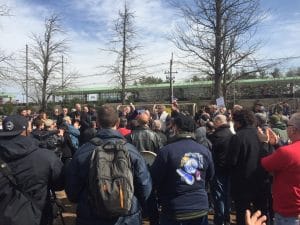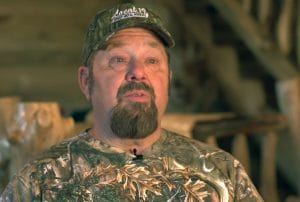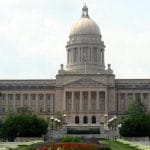Not long ago, the idea of online learning for sheet metal workers seemed unworkable. With hands-on skill at the heart of the trade, how could apprentices and journeymen learn without materials and an instructor in a live environment?
Yet the International Training Institute (ITI) has such a system, with numerous courses—and more in the works—available to any member in good standing. The site is a “Moodle,” short for Modular object-oriented dynamic learning environment.
The name is lengthy, but the idea is simple. “It’s just about workers going in and trying to bone up on their skills,” said Larry Lawrence, field representative for the ITI. “It’s also good for those who are in more rural areas.”
Simple, self-paced
Above all, Moodle is designed for ease of use. Members start by creating a member profile on the ITI website, sheetmetal-iti.org.
The portal brings original ITI courses directly to students and is free for all members in good standing. It runs on any operating system and web browser, including mobile devices.
Most important, it enables self-paced learning. Lecture-based classes work well in Moodle, allowing students to take section tests as often as it takes to pass them, Lawrence said.
“If we develop the courses, they’ll be free to our members and available anytime,” said Mike Harris, ITI Program Administrator.
“If a journeyman wants to take the foreman training course and doesn’t want to go to the training center, they can take it on Moodle,” Harris added.
Courses grow by demand
Moodle classes have included supervisor training, Fire Life Safety Level I and Level II Technician, foreman training, AutoCAD exercise, and safety classes such as residential safety, electrical safety and the Big 4 + 2.
Additional courses are in the works for 2016, Harris added. “We can put any type of class on there, as simple as video of a speech or lecture or as complex as you want it to be. It’s a pretty flexible system.”
Welding courses are already on the horizon, as well, including those to help certified welding inspectors (CWI) maintain their ratings.
“When you become a CWI, every nine years you have to have continuing education units—at least 20 units in the last three-year period,” Harris said. “We plan to put at least the last 20 units on the Moodle to help CWIs achieve that milestone.”
Once a course is finished, it’s up to the student to report it to their local’s training center coordinator to note it and record any continuing education units earned.
Member interest in online learning led to ITI’s use of the Moodle; demand also will dictate which and how many additional classes will be made available online.
“Now we’re seeing more need in this direction, and I think we’re going to push for it,” Harris said. “It’s being used in different ways. The more classes we get on the Moodle, the more people will use it that way.”
Author: paul

It is apparent that NJ Transit’s notice to the Coalition members represents retaliatory action and harassment of the Coalition members. This draconian action taken by NJ Transit while the Parties are engaged in the negotiation process illustrates NJ Transits unreasonable position and unwillingness to reach an amiable solution which is fair to both Parties.
The Union Coalition has engaged in ongoing negotiations with NJ Transit with the objective of reaching a settlement without the necessity of engaging in a strike.
Two Presidential Emergency Boards have issued recommendations which are consistent with the Coalition’s proposals; and of which the Coalition has fully agreed to comply with. Yet NJ Transit refuses to acknowledge these recommendations and continues its assault on our members.
We object to NJ Transit’s conduct in this matter while the Parties are fully engaged in the negotiating process. Such action on NJ Transit’s part is counterproductive to reaching an amiable solution through the negotiating process.

NJ Transit has ignored a Presidential Emergency Board recommendation for common sense and modest annual pay increases and better health care coverage. These proposals would cover the next six years.
NJ Transit has also ignored a bipartisan group of Democrats and Republicans across the state’s congressional delegation, which sent a letter urging NJ Transit to seriously consider the board’s recommendations.
Instead, NJ Transit wants to impose a significant increase in health care costs that would wipe out any wage increases for its own employees.
The International Association of Sheet Metal, Air, Rail and Transportation Workers (SMART) urges every local union and supporter who can make it to attend an important rally this Saturday, March 5th.
They need our support and solidarity now, more than ever. Wear your union colors, show your union pride and take a stand for your brothers and sisters!
Fraternally,
Joseph Sellers, Jr.
SMART General President
Time and Location
11:00 a.m. on Saturday, March 5, 2016
Marion & Norman Tanzman Recreational Area
Across the street from Woodbridge Train Station
405 Pearl Street
Woodbridge, NJ 07095
Working in partnership with the AFL-CIO Community Services Network, United Way Worldwide, our nation’s food security advocates and a host of other partners, the NALC gets food into the cupboards of those in need. The Stamp Out Hunger Food Drive is gearing up for its annual one-day event in May. Each year, postal workers dedicate their time to the food drive, which benefits local food banks across the United States.
While underemployment and joblessness remains high, the need for food assistance for working families remains great. All people need to do is place a bag of unopened, non-perishable food next to their mailbox before their letter carrier delivers their mail on Saturday, May 14, and the carrier will do the rest. Once collected, the food is taken back to the postal station, sorted and delivered by union volunteers to area food banks or pantries for needy families. The NALC Stamp Out Hunger Food Drive is the largest one-day food drive in the nation. Last year, more than 71 million pounds of food was collected, making it the twelfth consecutive year that collections reached over the 70-million-pound mark. Since the drive began in 1993, nearly 1.4 billion pounds of food have been collected.
This year’s Stamp Out Hunger Food Drive takes place on Saturday, May 14.

“In 2004, I found out that I was headed towards renal failure; my kidneys were shutting down,” Gilmer said. “I wasn’t sure how many more times I would be in my treestand.”
Luckily, Gilmer met a woman through his community volunteer work who offered to be tested as a potential donor and was a match. She donated a kidney, Gilmer recovered and the two were married in 2013. Now Gilmer treats each day and all those special moments in the woods as a gift.
An avid hunter for the past 45 years, Gilmer has harvested many whitetails with his bow, crossbow, rifle and handgun in Pennsylvania, but family commitments prevented him from going on a Western big game hunt. He finally got that chance when he saw an ad for the Union Sportsmen’s Alliance’s Brotherhood Outdoors TV series in his union magazine and applied to be a guest.
On November 20, 2015, Gilmer flew to Billings, Montana, and met up with Brotherhood Outdoors co-hosts Daniel Lee Martin and Julie McQueen along with his guide, Dale Denny of BearPaw Outfitters. The hunt kicked off exceptionally well the next day when the group spotted a very nice whitetail buck at first light. Gilmer’s hunting tag provided the option for a whitetail or mule deer, so although it took a lot of willpower, he decided to pass on the shot and hold out for a muley. Gilmer and the crew saw more than 100 deer that day, and about 40 percent were bucks, but Gilmer continued to be patient.
“The second day, we again saw plenty of deer, and just as we were going back to take a lunch break, we spotted some bedded mule deer – five does and one buck. That’s what I was hoping for,” Gilmer said.
When the buck and his does got up and headed over the next ridge, the hunters followed. They caught up with the deer just before they crossed over yet another ridge and headed into a canyon, and Gilmer got in position for a 120-yard shot on his first mule deer.
Does Gilmer get to give thanks for harvesting a mule deer buck just days before Thanksgiving or simply for the beautiful scenery and incredible opportunity?
Tune in to Brotherhood Outdoors on Sunday, March 6 at 11 a.m. ET on Sportsman Channel to find out. Visit www.BrotherhoodOutdoors.tv for full season schedule, photos, video clips and more.
Sneak Preview: https://www.youtube.com/watch?v=9y3IlLnsfy4&list=PLoPZxal6c47wfmOAyvYtM9mH30baSFLrW&index=38
Article by Kate Nation via Brotherhood Outdoors.
On January 26, 2016, SMART Sheet Metal General Committee 1 signed 17 new members that work for Bombardier at TriRail in Miami & West Palm, FL. After a long organizing campaign that lasted months, followed by a long round of negotiations, a five (5) year agreement was reached for members that perform mechanical and store house work for Bombardier.
The agreement gives members yearly General Wage Increases (GWI), bonuses and a cap on the cost of health care. According to General Chairman Joe Fraley, “the majority of these individuals have never been in a union prior to now. Because of this, we have and continue to spend time working individually with each worker on the enforcement of their new collectively bargained contract and what they can expect from their union. We look forward to using this success as a launching pad for further growth at here and at nearby facilities.”
Members planning to attend one or both of the SMART Transportation Division regional meetings this summer can now make reservations for either city. Details are available at the Transportation Division website at www.utu.org.
Regional meeting registration is available online now by going to the Meetings page and clicking on the respective city or by following the links below. Hotel information can be accessed by visiting www.utu.org and clicking on the “Meetings” box on the bottom of the homepage. Links to the host hotels, city visitor bureaus, and online car-rental are also available.
Click here to register online for the San Francisco regional meeting. Click here to register online for the Chicago regional meeting. Click here for the mail-in registration form.
Regional meetings will be held July 4-6 in San Francisco and July 25-27 in Chicago.
Each regional meeting will run for 2.5 days, ending early on the afternoon of the third day. The evening of the first day has been left unscheduled so you, your family and friends will be free to explore and enjoy the many offerings of the regional meeting cities.
All those attending the regional meetings must be registered in order to attend any planned social function. Children ages 11 and under who are pre-registered are complimentary.
The pre-registration fee for the 2016 regional meetings is $150 per member, spouse or child over age 11, the same fee charged the last eight years. Additional fees apply for the golf outings and family tours. You must make your own room reservations, and certain deadlines apply.
The $150 registration fee covers all workshop materials; a welcoming reception the night before the meeting; three lunches and one evening meal. Those wishing to attend only the workshops do not need to pay the registration fee. No one-day registrations are offered.
You may cancel your meeting registration 10 days prior to the first day of the meeting or the golf outing without penalty. Call the SMART Transportation Division at (216) 228-9400 or email PR_TD@smart-union.org immediately regarding any changes or cancellations.
If you choose to register by mail, you must submit a completed registration form listing each attendee, regardless of age. Complete payment in U.S. funds must be received at the SMART Transportation Division, 24950 Country Club Blvd., Suite 340, North Olmsted, OH 44070-5333, by June 19 for the San Francisco meeting or by July 3 for the Chicago meeting, or the registrant will be charged an on-site registration fee of $200.
Visit our meetings page on utu.org to take advantage of car rental discounts and to view more information on tours, golf, etc.
I would like to take this opportunity to thank every SMART member for your hard work in 2015, work that strengthens this union. It may not always be apparent, but along with union involvement, the day-to-day work you perform also reflects on our organization and on every member. I want to begin 2016 by recognizing the achievements and changes over this past year. The value of our combined strength is clear when we see local unions and members standing united, whether it be during election season, or while sharing resources to ensure that local union organizers and staff receive the proper education that helps them better represent you at the workplace.
With 2016 upon us, our legislative staff will work to ensure that your interests are served by getting a fair hearing on Capitol Hill and in the state capitols across the nation. We reached legislative milestones set through the passage of the recent FAST Act to improve America’s public transit and rail transportation systems. Thanks to the efforts of our legislative department, the FAST Act passed with sweeping bipartisan support and created provisions that include: protecting transportation members from assault; new tank car provisions protecting members and the general public; and, increased funding for transit and Amtrak operations.
This year promises to be an eventful year with the upcoming 2016 election. I thank those of you who provided input in response to the membership survey on the candidate that best represents our interests. Your voice matters, and if you haven’t done so already, I strongly urge you to make sure you and your family are registered to vote. There is nothing we can’t accomplish when our collective voices and action come together for a united purpose. Every single ballot makes a powerful impact and brings strength to our mission. Two years ago, Dan O’Connell, SMART TD’s State Legislative Director in New Jersey, ran for office in his hometown of Delran, N.J. and went to sleep on election night thinking he had lost by two votes. The next morning he woke to a flurry of messages congratulating him on his victory. During the night, absentee ballots brought him to a 15 vote lead. That’s the kind of impact your vote can make.
Brothers and sisters, we made a great deal of progress in the last year. I look forward to reporting back on the continued progress we will make in the coming year. Until then, I would like to wish each of you a safe and healthy New Year.

Clinton stood out to members based on her strong leadership, experience, competency and unwavering support for working families. The selection process had input from a survey of the union’s U.S-based members and from its leadership at the local, regional, and national levels.
SMART General President Joseph Sellers, Jr., said, “She has the real-world experience and dedication that makes her the right candidate to serve the interests of America’s working families in these turbulent times.”
Sellers noted that “Secretary Clinton’s plans are detailed and well-reasoned. On the economy, she will build on our apprenticeship and training programs, expand and improve freight transportation and transit and address environmental concerns with investments in energy efficiency. All of these involve jobs that members earn their living in every day.”
SMART surveyed its diverse membership on the 2016 election in December. The poll focused on issues, not candidates, in order for member feedback to guide the union’s electoral efforts in every race, at every level, in 2016 and beyond.
Members overwhelmingly chose jobs and the economy as their most vital interest. On qualifications, members indicated they want leaders to possess the competency, broad experience and serious approach necessary to tackle the nation’s difficult domestic and international challenges.
These, combined with the membership’s preference, led the SMART General Executive Council to approve Secretary Clinton for the Union’s support. SMART will mobilize its members across the United States to help ensure that Hillary Clinton is elected to serve as the next President of the United States.
Sellers also acknowledged Senator Bernie Sanders, saying, “I thank him for his lifetime of unwavering support for working families and especially for ensuring that the everyday issues working families face are squarely addressed in this campaign.”
Republican legislators in Kentucky have proposed SB 9 which would restrict prevailing wage protections from future state-funded projects. The bill passed through the Senate Standing Committee on Appropriations and Revenue and is due for a full Senate vote.
Changes to the prevailing wage are a priority for the state’s Republican legislators and tea party under newly-elected Governor Matt Bevin.
The state’s House is controlled by Democrats however special elections next month might create a 50/50 split if Republicans can capture four seats that are up for grab. The bill covers new school construction along with renovations along with college campuses, public works projects and work on public facilities.
Bill Londrigan, President of the Kentucky AFL-CIO, was on hand to testify against the bill. He argued that the prevailing wage is a public policy issue worth preserving due to it ability to take wages and benefits out of the factors used in competition thus giving local contractors, both union and non-union, a chance at capturing the work. This would allow local workers to be able to staff these jobs and ensure wages are reinvested in local communities – thus benefiting taxpayers.

